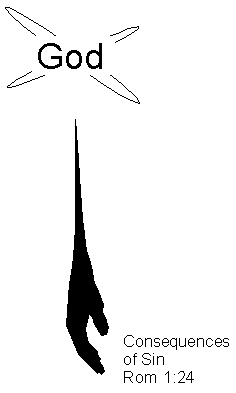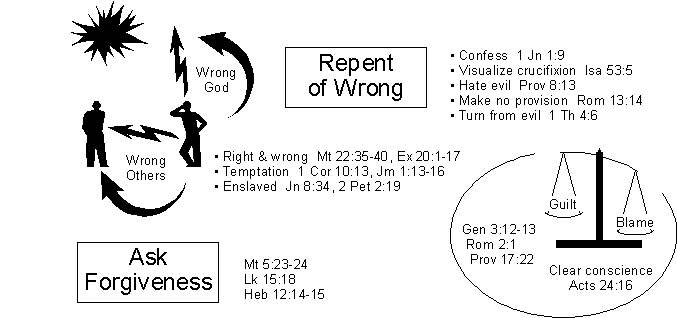
The third element which ultimately comes from the hand of God is the consequences of sin. Let us begin by understanding that sin has two possible pathways of offense: wrong toward God and wrong toward others (Mt 22:35-40, Ex 20:1-17). Sin always offends God, but it also may offend others.
Sin follows a progression. The origin of sin is not temptation from God but rather being enticed by our own lust (Jm 1:13-16). Lust leads to sin and sin leads to its consequences. Sin leads us into a bondage from which we must be set free (Jn 8:34, 2 Pet 2:19).
When God's standards of right and wrong are violated, there are natural consequences which must be endured (Rom 1:24) along with personal guilt. Typically we attempt to reduce guilt by blaming God and others as depicted by the guilt-blame scale (Gen 3:12-13). Blame, anger, revenge, bitterness and so forth can therefore be an indication of unresolved guilt in one's life.

The strong relationship of blame to guilt links other elements of soul cleansing to personal sin. For example, rejection of self and authority and the resulting blame may be related to unresolved guilt. We must deal with both sides of the scale, guilt and blame.
As opposed to blaming, God would have us seek a clear conscience before Him and others (Acts 24:16). We can clear our conscience by first thoroughly repenting of our sin before God (1 Jn 1:9). While our initial salvation involves confession, our ongoing walk with God includes repenting or turning from sin as detailed above. The second step to clearing our conscience is seeking forgiveness of others (Mt 5:23-24). Asking forgiveness of others goes beyond apology. It reflects real repentance and requests release of their blame.